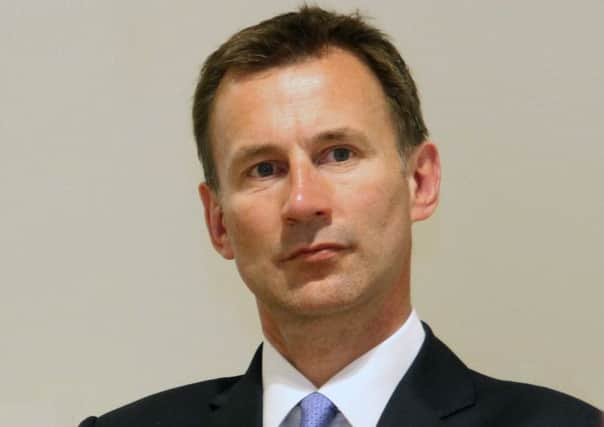NHS’ 111 phone line is ready to deal with Ebola sufferers, Health Secretary Jeremy Hunt announces


Call handlers on the service are to question anyone ringing up with possible symptoms of the deadly virus about their travel history, to see if they have been to West Africa, where the death toll has passed over 4,000 people.
The announcement comes after the Mayor of London, Boris Johnson, conceded he has “little doubt” that a case of Ebola will come to the UK, after it emerged a Dallas health worker became the second US victim to be infected.
Advertisement
Hide AdAdvertisement
Hide AdStating that the UK has “robust and well-tested systems” for dealing with any imported case of Ebola, Mr Hunt said: “We keep the need for further measures under review and will never be complacent – and so I asked for additional steps to be taken by NHS 111.
“Now all call handlers on the NHS 111 service are asking anyone reporting potential symptoms of Ebola, such as respiratory problems, high temperatures, or diarrhoea and vomiting, about their recent travel history, so appropriate help can be given to people who might be at higher risk of having come into contact with the virus.”
The Government’s preparations for the potential arrival of Ebola appear to be heightening. Prime Minister David Cameron initially resisted the idea of screening for Ebola at key airports, Eurostar terminals and ports, but soon ordered health checks on people entering the UK from Sierra Leone, Guinea and Liberia – the three worst-affected nations – following a change in medical advice.
Although there are no direct routes to the UK from those countries, passengers who have taken connecting flights will face questionnaires and medical assessments, but not temperature checks as in the US.
Advertisement
Hide AdAdvertisement
Hide AdThe move prompted Boris Johnson to admit that London was a likely location of an outbreak but added his voice to criticisms of screenings at UK airports, which surround the notion that incoming passengers may not yet display symptoms of Ebola when they are screened.
“I have little doubt that eventually there will be a case of Ebola in this country and probably this city,” he told BBC1’s Andrew Marr Show. “All I can tell you is that to the best of my knowledge we have fantastic preparations in London for this. We have very good healthcare in this city.”
He added: “The idea of screening at airports is, I’m afraid, far from perfect as a solution. What you need to do is make sure people coming from the affected countries are properly screened, properly tested when they leave.”
The Dallas healthcare worker who contracted Ebola was in full protective gear when she provided care to Thomas Eric Duncan during his second visit to Texas Health Presbyterian Hospital. He died on Wednesday.
Advertisement
Hide AdAdvertisement
Hide AdDr David Lakey, commissioner of the Texas Department of State Health Services, said: “We are broadening our team in Dallas and working with extreme diligence to prevent further spread.”
On Saturday, Dame Sally Davies, England’s chief medical officer, said it would not be surprising if there was a “spillover” of Ebola into the UK in the next few months, while medical staff and emergency services conducted a national exercise to test Britain’s readiness, in which actors simulated symptoms to test emergency service response.
Saturday’s test exercise was part of the UK’s contingency plan against Ebola.